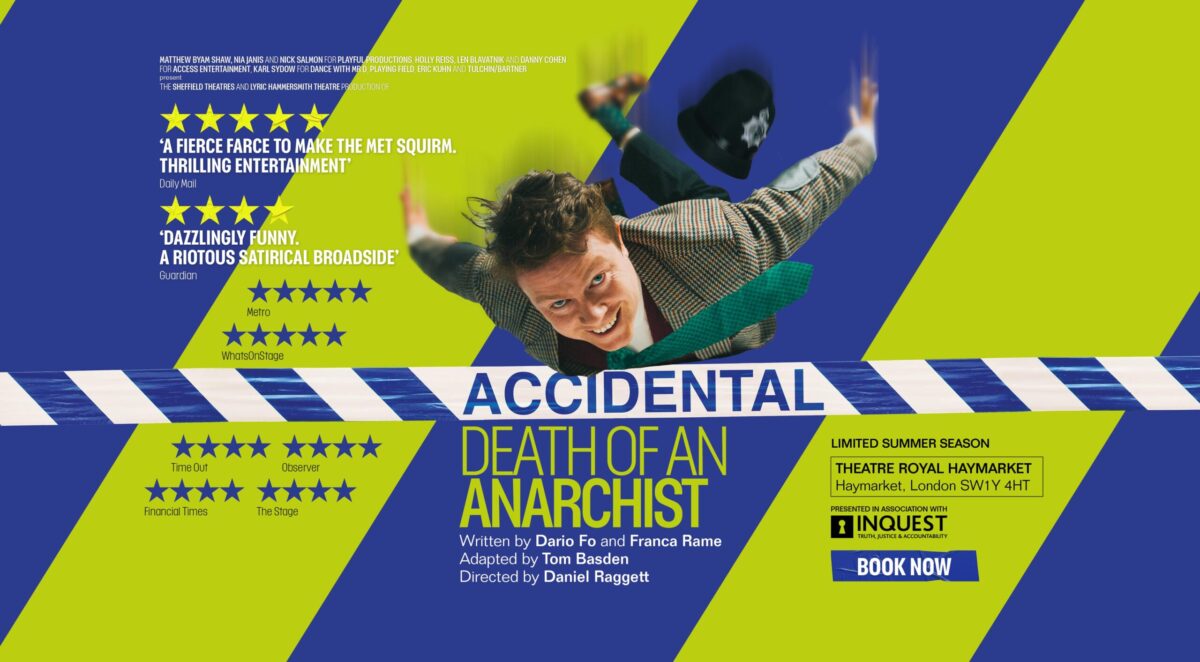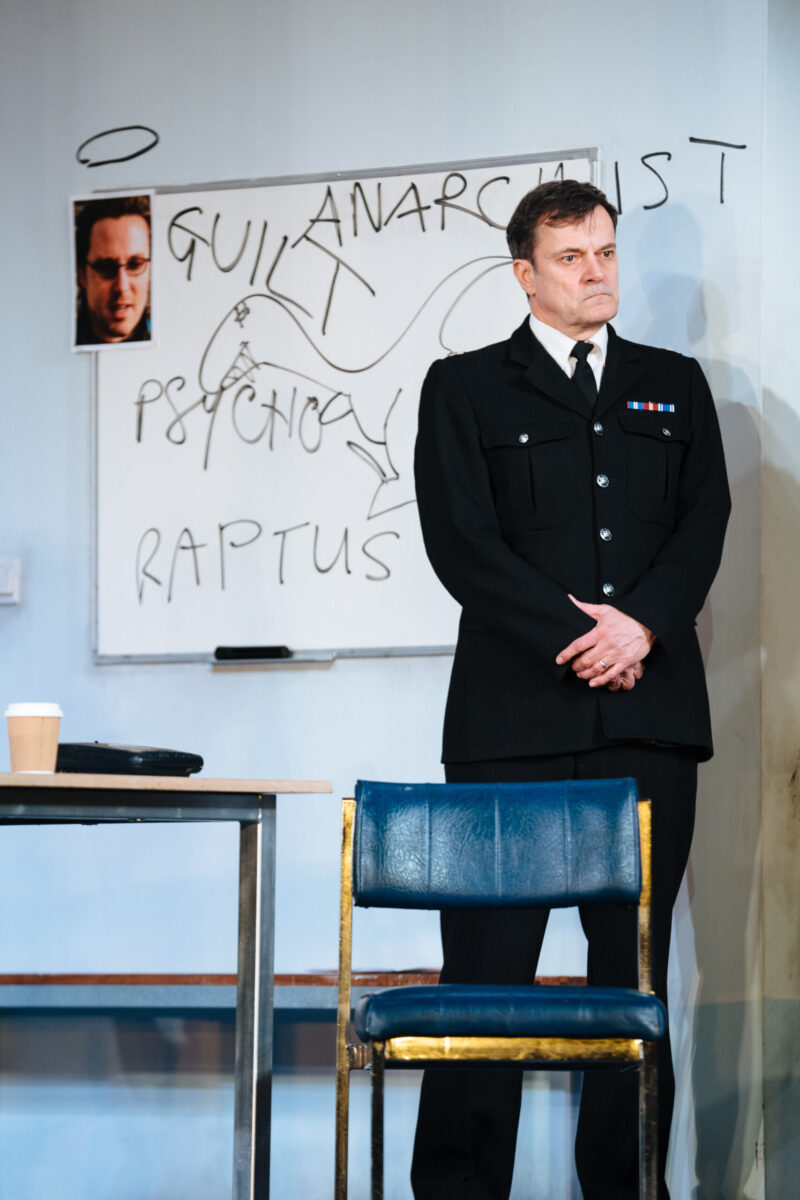Beg, borrow, or steal a ticket to this show. Stop reading this review now and book online. It sold out in Hammersmith and Sheffield. Some of you may be coming down to London for a demonstration or a conference. Book it. Others may be taking their family or partners down for a day out. Book it. You may have a flight out of London sometime soon. Book it. If you have an invitation to a wedding, birthday, or christening, stay an extra day. Book it. Take up your friend’s offer of hospitality in London that you have avoided taking up. Book it. This play is so worth seeing that I even got out of bed really early on a Sunday to tell you about it. I know it is only on at the moment in London. We should start an immediate petition or campaign to get it on tour or to have a film made of it so that we can show it in our communities. They have produced a book of the script, so if you really cannot book it, buy it.
Beg, borrow, or steal a ticket to this show. Stop reading this review now and book online. It sold out in Hammersmith and Sheffield.

What is all the fuss about?
The play, written over 50 years ago in 1970, is a satire based on the real-life story of the Italian anarchist and railway worker, Guissepe Pinelli, who was detained in a Milan police station after being accused of involvement in bombing the Agricultural Bank in the Piazza Fontana a few days before Christmas, on December 12th, 1969. It was a massacre, with more than 17 dead. The anarchists were immediately blamed for the slaughter. Just before midnight on December 15th, 1969, Pinelli was seen falling to his death from a fourth-floor window of the Milan police station. Three police officers interrogating Pinelli, including Commissioner Luigi Calabresi, were put under investigation in 1971 for his death, but legal proceedings concluded it was due to accidental causes. Specifically, he had gotten dizzy and suffered a sort of psychological crisis or panic attack. The play uses the term ‘raptus’ to poke fun at this explanation. Pinelli, a local anarchist leader and railway worker, was later cleared of any involvement in the bombing; neo-fascists were later convicted of the massacre. Many people in Italy believe that it was not an accident.
Fo and Rame concentrate on the police cover-up and the various versions of what they say happened. We are used to this happening here. The young people who died in Cardiff were not being chased by a police vehicle. Then, after a video is found, the story is changed. Mark Duggan, shot dead by police in 2011, which led to riots, supposedly raised a handgun, but then no handgun was found. There are too many examples to list here.


What makes this political play a masterpiece is the way they tell the story of the cover-up. Let’s face it, we have all gone to political plays that are well-intentioned and very earnest but are not very dramatically moving or very funny. Watching this, you leave the theatre as if you had been chanting a lot on a demo; your throat is sore from the laugh-a-minute script. All aspiring writers of political theatre or agitprop should be required to see this or any other of Fo or Rame’s plays. If reactionary media like the Daily Mail are giving it five stars, you know that the play is hitting parts other plays don’t and can reach beyond the leftie bubble.
Watching this, you leave the theatre as if you had been chanting a lot on a demo; your throat is sore from the laugh-a-minute script.
The central character, the maniac, infiltrates the police station and takes on various roles. He tricks the police into thinking he is the judge for a new enquiry into the case. First he provokes consternation among them because he comically shows how ludicrous their justification for the death is, then he poses as a forensic expert who can help them create some sort of believable version so they can get away with it. Of course, the more he takes their side, the less believable their story!
The virtuosity of the play also lies in the way it is a series of plays within a play—a continued riff on how theatre works. The Maniac invites the police to act out what happened and exposes the inconsistencies of their story. I loved the bit where he gets the police to act out their childhood love of railways so that they could appear to be sympathetic to the anarchist railway driver and thereby look innocent. He got the police inspector to make the choo sound of the engine—surreal but based on lived reality.
People recently raved about how Fleabag, the TV comedy drama created by Phoebe Waller-Bridge, was so innovative by breaking the Fourth Wall. This is the convention: you do not break out of the imaginary events you are displaying to talk directly to the audience or externally comment on the play you are acting out. Fo/Rame, following Berthold Brecht’s innovation in this respect, were doing this in 1970. Politically radical, it jerks the audience into escaping into another reality without relating it to the ideologies of the system they are actually living in.
Daniel Rigby is brilliant as the main character, although at times his barbs are delivered at such a machine gun pace that you are still taking in and laughing at one line when another one rips out. A bit more pacing would have been effective. The rest of the cast is terrific, although it was hard to follow the journalist’s voice in the second act.
Fo and Rame were well trained in the Commedia Della Arte tradition in Italy, which goes back centuries. Physical comedy is integral to this, and Rigby gets it right—there are scenes at the notorious window and as he gets off the table that are very well done. The artificial arm of the ‘forensic expert’ gets a lot of laughs too.
Fo and Rame were well trained in the Commedia Della Arte tradition in Italy, which goes back centuries. Physical comedy is integral to this, and Rigby gets it right—there are scenes at the notorious window and as he gets off the table that are very well done.
The set is imaginatively done, with the window deservedly taking centre stage. Shifting the scene from the first floor of the police station to the fourth is very cleverly done. The big clock is used well to communicate how the police kept changing the timings noted down in their versions of events.
Tom Basden has done a fantastic job adapting the play. We were expecting a ‘classic’ re-run of the Italian version, but he has ingeniously used Fo/Rame’s script as a template, which he fills with continual references to the Met police and British politics. Events at Clapham Common regarding the Sarah Everard case, the sexist and racist police WhatsApp groups, Suella Braverman’s attack on migrants, and the rights to protest are seamlessly inserted. Basden adroitly keeps the historical link with Pinelli and taps into contemporary politics by making him a migrant train driver. Fo and Rame, now both dead, would have loved this; they got the whole play together within a year of the events and saw it as a political intervention in Italian politics. It was never their personal property, but a tool for the movement.
What was encouraging was that although there were quite a few senior lefties like our group, a lot of the audience were not even born at the time of Pinelli’s death. I overheard some of the younger people enthusing about it on the way out, saying how it chimed with their view of the Met. The play hits the West End just as the crisis at the Met has become very serious indeed. For an official review, Baroness Casey’s evaluation of the Met was devastating, even questioning whether it should survive in its present form.
What was encouraging was that although there were quite a few senior lefties like our group, a lot of the audience were not even born at the time of Pinelli’s death. I overheard some of the younger people enthusing about it on the way out, saying how it chimed with their view of the Met.
Since 1970, when the play was first performed, there have been over 3,000 deaths in police custody. 1,800 disciplinary investigations into staff misconduct in the Met, for example, led to only 13 recorded censures. We should keep up the scrutiny; there is no justice without truth.
Accidental Death of an Anarchist – Book Now
Art (53) Book Review (121) Books (114) Capitalism (65) China (79) Climate Emergency (98) Conservative Government (90) Conservative Party (45) COVID-19 (44) Economics (40) EcoSocialism (55) Elections (83) Europe (46) Fascism (56) Film (49) Film Review (68) France (70) Gaza (60) Imperialism (98) Israel (124) Italy (46) Keir Starmer (52) Labour Party (111) Long Read (42) Marxism (48) Palestine (169) pandemic (78) Protest (152) Russia (340) Solidarity (142) Statement (48) Trade Unionism (141) Ukraine (346) United States of America (132) War (368)
Latest Articles
- Arse backwardsArse backwards is an apt way to express how disabled people are treated argues Sandra Wyman
- Stop Seapeak’s sanctions bustingFred Leplat argues that the campaign against Seaspeak needs stepping up
- On the illegal Israeli aggression against IranA statement by Radical Socialist India
- Anti‑austerity protest – 7 June 2025 – ACR bulletin FIght for EcosocialismThe ACR bulletin for the 7 June anti-austerity protest called by the People’s Assembly.
- British government declares Palestine Action terroristsThe Labour government at Westminster proscribing Palestine Action as a terrorist organisation is a ridiculous undemocratic move by a government that only exists to perpetuate war and capitalism, argues Simon Hannah





